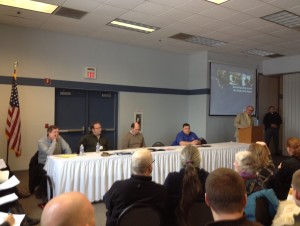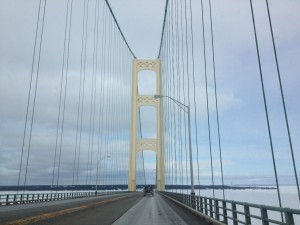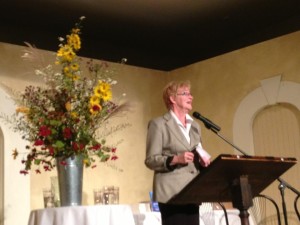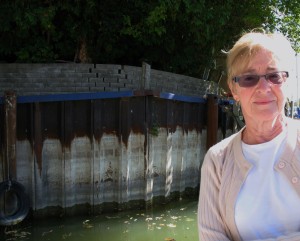

FLOW Executive Director Liz Kirkwood
FLOW and a number of organizations have come together over the last year to rally the public and raise awareness about the Canadian energy company Enbridge and their Line 5 pipeline, a 61-year-old pipeline under the Straits of Mackinac in the Great Lakes which has increased in flow and pipeline pressure and poses a great risk to our common water. On February 5, I carpooled up to St. Ignace, Michigan to attend a public meeting wherein Enbridge delivered a presentation to Mackinac County officials (and a packed room full of concerned citizens) to assuage growing concerns about the Line 5 pipeline expansion. My companions Jim Dulzo from Michigan Land Use Institute, FLOW intern Jonathan Aylward and I didn’t know what to expect, but we certainly all had a lot of questions that remained unanswered.
Background: The issue captured our attention after a critical 2012 report from National Wildlife Federation (NWF) titled Sunken Hazardpublished the scary facts: if Line 5 were to leak, then in the eight minutes that it takes for Enbridge to shut off the pipeline about 1.5 million gallons of oil would release, along with catastrophic impacts and dispersion across both Lakes Michigan and Huron. However, this is not even the “worse case discharge” given that it took the same company, Enbridge, 17 hours to respond to the worse inland oil pipeline spill in U.S. history along the Kalamazoo River just 3 years ago. In short, the Great Lakes have never been more at risk and yet the public is largely uninformed.
Why FLOW is concerned:
- We know that Enbridge has “upgraded” Line 5 with new pump stations but we don’t know for sure what “product” (light or heavy, sweet or sour, dilbit, etc) is being transported 640 miles from Superior, Wisconsin through the Straits of Mackinac to Sarnia, Ontario;
- Heavy tar sands is the dirtiest and most carbon-intensive energy on earth and a spill would destroy our shared international waters and way of life;
- This “upgraded” pipeline is 61-years-old and is submerged under water in the heart of the Great Lakes that contains 20 percent of the world’s fresh surface water;
- Enbridge has a dismal pipeline safety record, underscored by the two recent heavy tar sands disasters in Marshall, Michigan along the Kalamazoo River (1 million gallons spilled in 2010) and Grand Marsh, Wisconsin (50,000 gallons spilled in 2012);
- Federal pipeline regulations do not provide for public disclosure in the event of a product change from light crude oil to heavy crude oil for example; and
- An unsettling feeling of lack of transparency and public disclosure about the safety of Line 5 for the Great Lakes.
The Enbridge “side of the story”
At 2 pm at Little Bear Arena in St. Ignace, Mackinac County Planning Commission (“the Commission”) Chairman Dean Reid stood before 175 people, amazed at the turnout, and explained the rationale for this special meeting. The fact of the matter was that the Commission “wanted to hear Enbridge’s side of the story” after receiving NWF’s Sunken Hazard, and video footage of the submerged Line 5 under the Straits of Mackinac. Interestingly, though, I learned from Beth Wallace at NWF who co-authored the report that the Commission did not invite NWF to participate as a panelist to publically present both points of view.

Commission officials and the audience listen to the Enbridge representatives’ presentation.
Chairman Reid laid out the agenda, calling for Enbridge to address the integrity of their Line 5 pipeline under the Straits of Mackinac, the frequency of their testing, and emergency procedures in the event of a pipeline rupture. Recognizing the potential regional impact a spill would have in the Straits, the Commission invited other local units of government and organizations to attend this meeting. No public comments were allowed, but Enbridge panelists read and answer cards with written questions.
Next came Enbridge Community Relations Director Jackie Guthrie who described herself as a mom but also as a former lieutenant colonel in the U.S. Army. She gave the audience a succinct and compelling PR presentation on Enbridge’s overall operations. “Think of Enbridge as the ‘Fed-Ex’ of the oil and gas industry,” she cleverly described, “Enbridge delivers 2.5 billion barrels of crude and liquid petroleum, 5 billion cubic/feet of natural gas, and 1,600 MW of renewable energy a day.” Her numbers underscored the amazing recent growth of this billion-dollar company coinciding with North America’s energy boom. For example, in the last seven years, Enbridge had doubled its employees to 11,000. Guthrie concluded her overview by noting that Enbridge was recognized as one of the Global 100 Most Sustainable Corporations in the World.
This last claim got me thinking: if Enbridge can get that level of praise despite its shocking track record of 800 pipeline spills in the U.S. and Canada between 1999 and 2010, leaking 6.8 million gallons of oil and causing the largest inland heavy tar sands rupture in U.S. history, I wonder what the other energy companies are like.
Guthrie described the Line 5 as a 650-mile pipeline originating in Superior, Wisconsin traveling across the Upper Peninsula across the Straits of Michigan and down to Sarnia, Ontario. Line 5 is a 30-inch pipeline, except across the Straits where it divides into two 20-inch pipelines. Guthrie emphasized that Line 5 was carrying “light crude oil” which has “the consistency of skim milk.”

The view driving across the Mackinac Bridge: the Enbridge Line 5 oil pipeline is submerged beneath the same Straits of Mackinac that the Bridge traverses.
Blake Olson, Enbridge’s Escanaba Area Manager for over 400 miles of Line 5, followed with a presentation on the integrity of the Line 5 pipeline. He described Line 5 in the Straits as a one-inch thick seamless steel pipe, build with such a robust design that they just don’t build pipelines like this anymore. In fact, Olson commented that Line 5 at the Straits is the thickest pipeline in North America. Since 2012, Enbridge had increased the flow or volume of the product by 10 percent. Then he made the case that Enbridge had made a number of significant upgrades in their leak detection system within the last couple of years, including:
- automatic shut-off valves at both sides of the Straits,
- replacement of St. Ignace Valve Yard (2011) and Valve Yard containment system (2012),
- the on-going installation of emergence flow restriction devices,
- a back-up electric generator installed in 2013, and
- a thermally imaging leak detection system to be installed this year.
In addition, Olson described Enbridge’s integrity protective system along Line 5, which included corrosion prevention with coal tar coating and cathodic protection, anchor strike prevention and brackets every 50 feet (coming this summer), monitoring with internal and external pipeline inspections, lighted shore signage and nautical charts stating DO NOT ANCHOR.
Too little, too late?
This was an impressive list to the casual listener/observer, but what troubled me was that a lot of these basic safety protections to ensure pipeline protection were recently instituted and this pipeline was 61-years-old. For example, in the 61 years of this pipeline’s history, the U.S. Coast Guard did not have nautical charts informing vessels about the very location of Line 5 until January 2014. This change only happened because a number of concerned Michigan groups met with the Governor’s office to discuss Line 5’s safety in December 2013.
Olson assured the audience that Enbridge’s integrity program demonstrated that Line 5 under the Straits was “fit for service” with no dents or anomalies and met all federal pipeline regulations.
Before the Q&A session, Enbridge invited its contractor Bill Hazel from Marine Pollution Control to provide an overview of the emergency response measures set in place in the event of catastrophic spill on Line 5 under the Lakes. Hazel pointed to a number of simulated winter emergency response drills that Enbridge had participated in or serves as the lead in 2008, 2012, 2013, and this year. What became crystal clear was how catastrophic a Line 5 rupture would be especially during the wintertime. One follow-up question captured our imagination of this seemingly impossible mission: ‘May day, May day, May day! It’s January 21, 2014 and it’s -9 °F and the wind chill is -25 °F, the Straits of Mackinac are frozen over, the ice four feet deep, and Line 5 has ruptured under the ice. What are you going to do about it?’

Left to right: Jim Dulzo, MLUI; Jonathan Aylward, FLOW; Lee Sprague, Little River Band of Ottawa Indians; Anne Zukowski, Don’t Frack Michigan; Jannan Cornstalk, Little River Band of Ottawa Indians
Enbridge answers (some) public questions
Following a final word from the local emergency manager in Mackinac, Guthrie gathered the 5×7 questions cards, proceeded to sort them into piles, and distributed them to the appropriate Enbridge representative for answers at the podium. Several illuminating points came out:
- Line 5 only transports light crude oil, the consistency of skim milk.
- Line 5’s light crude oil currently comes the Bakken oil fields.
- There are no plans to pump heavy crude oil through Line 5.
- Seamless pipe wasn’t really a seamless pipe as Enbridge had described previously, rather Line 5’s two 20-inch pipelines are seamless only up to the joints that repeat every 40 feet along the 4-mile stretch along the bottomlands of the Straits.
- A wintertime spill would present unprecedented challenges in mounting an emergency response.
- If a rupture occurred and the automatic shut-off valves turned off in a 3-minute period, 5,500 barrels would be released and disperse over an area 25-square-miles wide. This number was down considerably from 15,000 barrels before Enbridge installed the automatic shut-off valves.
The last question was: ‘If tar sands were being transported through Line 5, what pipeline changes would Enbridge have to make?’ Enbridge’s Guthrie pulled the card aside and said, “let me hold off on this question because it is complex.” But time was on Guthrie’s side as the meeting ended sharply at 3:30 pm and she never had to answer this telling question.
The composed Midwestern temperament of the room quickly changed as audience members shouted out that their questions had not been answered. But it was clear that the meeting was over.
The bottom line for the bottomlands
I walked out into the 12 °F air, looked out over the Straits and felt an urgent need for additional public forums in Mackinac and the Great Lakes to further educate and inform all walks of life who live here about Line 5. Enbridge had attempted to calm the public’s concerns about Line 5, but they hadn’t been entirely forthright and it bothered me. Without public transparency, we will need to engage the State of Michigan to assert its authority as trustee of the waters and bottomlands of the Great Lakes for the benefit of the public.
What I’m talking about is the public trust doctrine, which legally requires Governor Snyder and both the Department of Natural Resources and the Department of Environmental Quality, as state trustees, to ensure that Enbridge’s Line 5 under the Straits will not impair the public waters of the Great Lakes. This means that the State must demand full transparency and disclosure of all Enbridge’s activities not only for the people within range of a potential catastrophic spill, but for all residents of Michigan. Thus, if and when Enbridge decided to transport any type of heavy tar sands oil through Line 5, Enbridge has a duty to inform the state and the public and secure proper authorization under the Great Lands Submerged Lands Act. That’s FLOW’s take on the issue, and it’s what you will be hearing more about in the weeks and months to come. Stay tuned.

















 PROBLEM
PROBLEM PROBLEM
PROBLEM PROBLEM
PROBLEM

